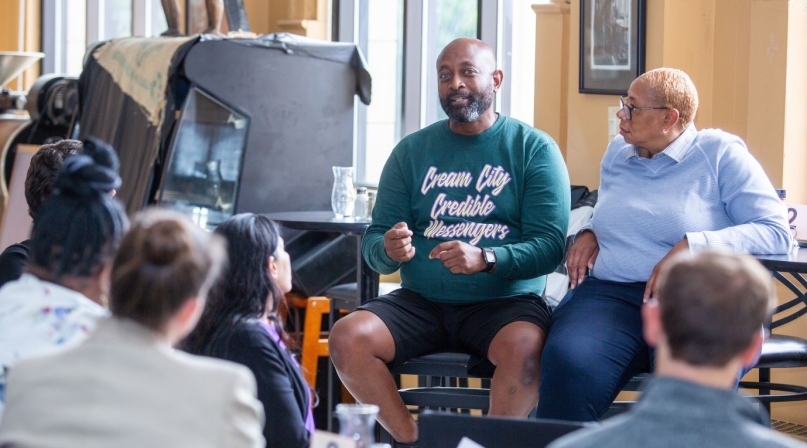Family response is key to treating opioid disorders
Author
Upcoming Events
Related News

Key Takeaways
Reducing barriers to opioid use disorder treatment can save lives.
With that in mind, Milwaukee County, Wis. is taking steps to make sure those resources are as close to the people who need them as possible, including strategic placing of harm-reduction vending machines in historically underinvested neighborhoods.
Community-driven efforts, facilitated by social service connection organizations like WestCare, highlight the importance of collaboration between service systems, youth engagement and environmental prevention.
Learn more
Those were just some of the ideas presented when NACo’s Opioid Solutions Leadership Network and Prenatal-to-Three County Leaders Academy met there in August.
The cohorts also toured key elements of Milwaukee County’s health and human services system, including the Penfield Children’s Center, where county leaders learned about the importance of early intervention services for young children.
At Coffee Makes You Black, Opioid Solutions Leadership Network members heard from key community partners in holistic and behavioral health service provision. The discussion focused on practical strategies to address the urgency of the overdose crisis, with a focus on eliminating hurdles that prevent people from accessing necessary resources. This included creating same-day access to services and implementing a “no wrong door” approach, where those with behavioral health needs can be linked to treatment and recovery services through interaction with any organization, including county entities throughout the criminal legal system.
Crucially, involving individuals with firsthand experience in substance use challenges was highlighted, as their insights are invaluable in understanding the complexities of their needs.
Additional emphasis was placed on family-centered care, recognizing that families are the cornerstone of communities. Representatives and “graduates” of the sober living homes run by Samad’s House spoke to the importance of having gender-specific care for women in recovery and in finding community.
“My fight is to save lives. My fight is to show women that they can recover, recover their lives and live holistically,” founder Tahira Malik told the cohort.
Through peer-learning discussions, county leaders determined that equitable treatment distribution requires active community engagement and breaking barriers and addressing access disparities.
By leveraging cross-cutting approaches, counties can ensure that no one is overlooked and that services can be designed to save lives, strengthen families and contribute to thriving communities.
The national convening promoted the need to strengthen cross-systems collaboration to promote positive outcomes for children and families, especially those experiencing systemic and structural barriers.
Featured Initiative
Opioid Solutions Center
NACo's Opioid Solutions Center empowers local leaders to invest resources in effective treatment, recovery, prevention and harm reduction practices that save lives and address the underlying causes of substance use disorder.

Related News

U.S. House reintroduces legislation to address the Medicaid Inmate Exclusion Policy
Two bipartisan bills aimed at addressing the Medicaid Inmate Exclusion Policy (MIEP) were recently reintroduced in the U.S. House of Representatives.

House E&C Committee advances SUPPORT Act reauthorization
On April 9, the U.S. House Energy and Commerce Committee marked up the SUPPORT for Patients and Communities Reauthorization Act of 2025. The bipartisan bill aims to reauthorize critical programs that target overdose prevention amid the renewal of the opioid crisis Public Health Emergency declaration.

Bird flu update: What county leaders should know
As of April 7, there have been 70 confirmed cases of bird flu in the United States, but no person-to-person spread has been detected.
